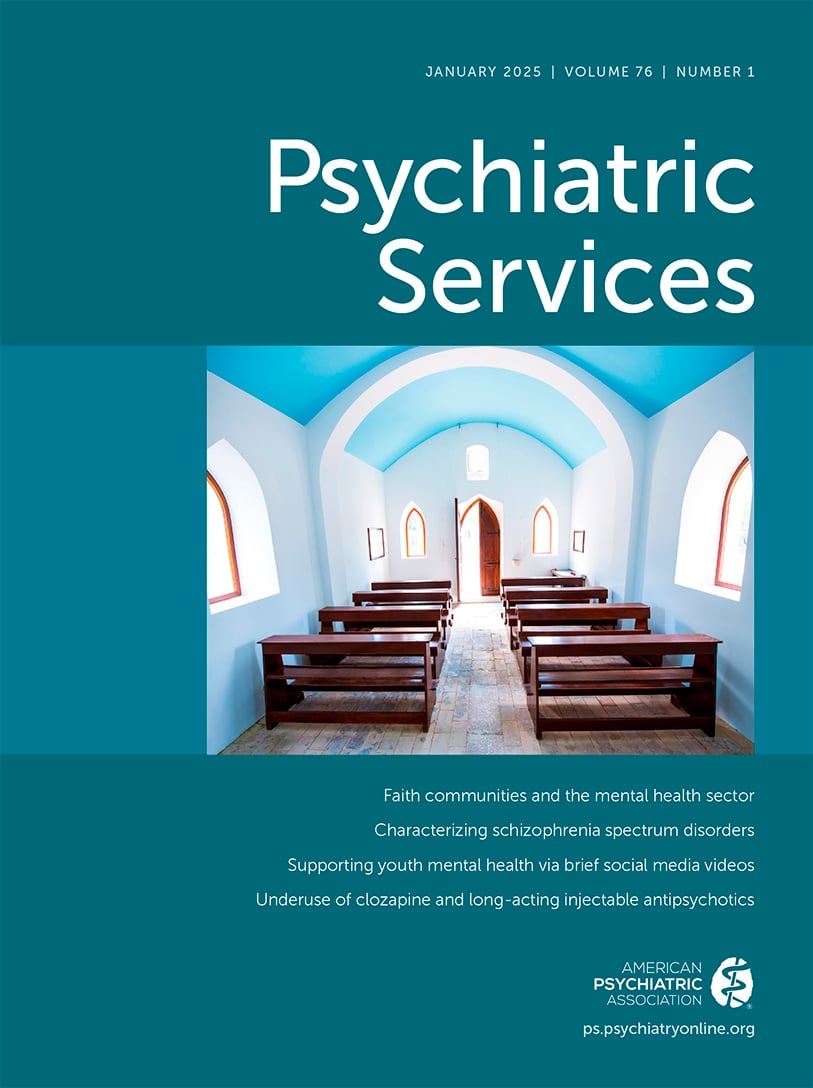Psychiatric Services
- Volume 44
- Number 10
- October 1993
Article
Publication date: 01 October 1993
Pages937–942Many concerns have been raised about the special problems of providing care for severely mentally ill persons in a reformed health care system based on managed competition. The authors describe what will likely be basic features of the reformed system and ...
https://doi.org/10.1176/ps.44.10.937Publication date: 01 October 1993
Pages943–950Objective: To better understand the strengths and weaknesses of systems of services for seriously mentally ill individuals in Canada and the United States, the quality and cost of services in the province of British Columbia (population 3.2 million) were ...
https://doi.org/10.1176/ps.44.10.943Publication date: 01 October 1993
Pages951–958Interest in the relationship between social class and schizophrenia has diminished in recent years. However, these issues can usefully be reconsidered in light of increased recognition that schizophrenia has a protean course, that deinstitutionalization ...
https://doi.org/10.1176/ps.44.10.951Publication date: 01 October 1993
Pages958–962Uninsured and underinsured persons in the United States have limited access to health and mental health care and often enter the health care system via hospital emergency rooms. This pattern is even more pronounced among ethnic minorities, particularly ...
https://doi.org/10.1176/ps.44.10.958Publication date: 01 October 1993
Pages963–966In April 1992 the health ministers of all Australian states, territories, and the federal government endorsed Australia's first National Mental Health Policy. The major principles outlined in the policy include protecting consumers' rights, setting ...
https://doi.org/10.1176/ps.44.10.963Publication date: 01 October 1993
Pages967–973The legal concept of the right of psychiatric patients to treatment in the least restrictive alternative has come to mean treatment anywhere but in the state hospital, as illustrated in two large communities in Ohio and Massachusetts. Oversimplified ...
https://doi.org/10.1176/ps.44.10.967Publication date: 01 October 1993
Pages973–976The number of state hospital beds nationwide has been reduced to 40 per 100,000 population; in California, nonforensic state hospital beds have decreased to 8.3 per 100,000. The main effects of this reduction are becoming more evident. Most seriously ...
https://doi.org/10.1176/ps.44.10.973Publication date: 01 October 1993
Pages977–980The types of social welfare benefits available for mentally ill patients, including Social Security, Social Security Disability insurance, Supplemental Security income, Aid to Families With Dependent Children, Medicare, and Medicaid, are briefly described,...
https://doi.org/10.1176/ps.44.10.977Publication date: 01 October 1993
Pages981–985Retrenchments in federal financing, more stringent residency accreditation standards, fewer psychiatric residents, and other factors are putting increased pressure on psychiatric residency training programs to collaborate with or even merge with other ...
https://doi.org/10.1176/ps.44.10.981Publication date: 01 October 1993
Pages985–990The state of South Carolina is in the process of transforming its core services for people with severe and persistent mental illnesses to a community-based model. This paper describes the planning and on-going implementation of an alliance of academic ...
https://doi.org/10.1176/ps.44.10.985Publication date: 01 October 1993
Pages1000–1001Patients with borderline personality disorder provide an ideal sample for a study of impulsive sexual behavior and factors related to it in psychiatrically ill women. Even though impulsive sexual behavior is one of the DSM-III-R criteria for borderline ...
https://doi.org/10.1176/ps.44.10.1000Publication date: 01 October 1993
Pages1002–1004The utility of a given typology is based on the degree to which the resulting groups are relevant to the purpose intended. The results presented here indicate a structurally stable model that classified residents into well-defined groups particularly ...
https://doi.org/10.1176/ps.44.10.1002Past Issues
View Issues Archive
Vol. 76 | No. 1

Vol. 75 | No. 12

Vol. 75 | No. 11
